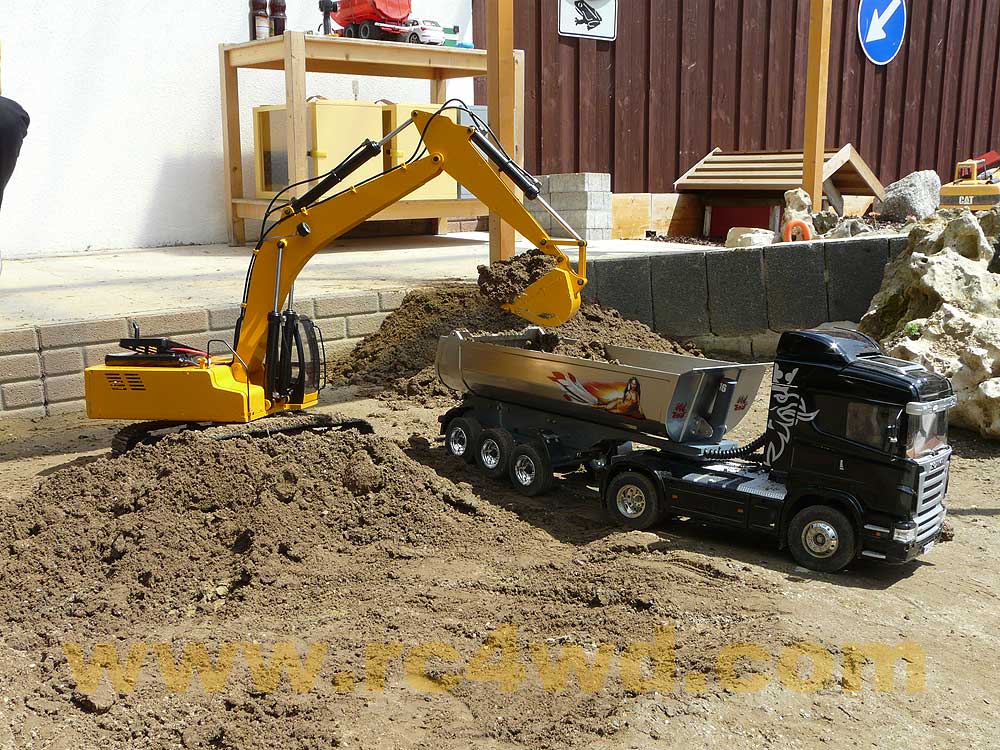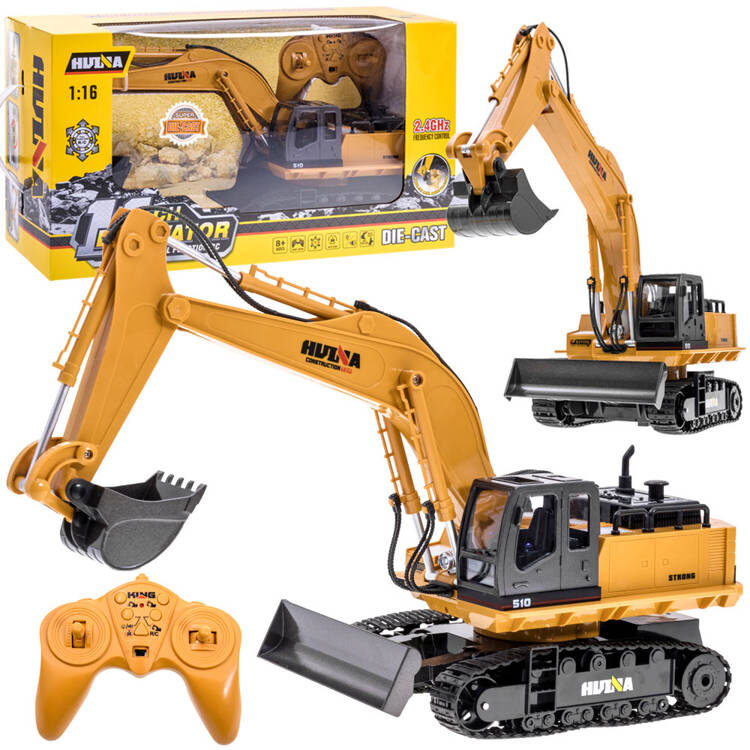Discover the Importance of Excavator in Modern Building Projects
Excavators are essential devices in modern building and construction projects. Their adaptability allows them to execute a vast array of tasks, from excavating and grading to demolition and website preparation. Advanced functions, such as hydraulic accessories and GPS, boost their capacities and effectiveness on job websites. As the industry advances, the importance of excavators expands a lot more. Understanding their duty can reveal insights right into the future of building and construction techniques. What lies ahead for these makers?
The Flexibility of Excavators in Different Projects
Excavators are often associated with large building tasks, their adaptability enables them to be used in a wide range of applications, from residential landscape design to energy upkeep. In urban setups, excavators can browse limited rooms to dig foundations for homes or mount drainage systems. Their capability to carry out fragile tasks makes them optimal for landscape design projects, where they can excavate for ponds or plant trees. On top of that, excavators play a crucial function in utility maintenance, efficiently digging trenches for pipelines or cable televisions without interfering with surrounding locations. In agricultural applications, they aid in land cleaning and dirt prep work. Furthermore, their versatility allows them to be geared up with different add-ons, enhancing their capability throughout different jobs. This complex nature of excavators not just enhances different building processes yet additionally demonstrates their indispensable function in modern-day facilities growth and maintenance.
Key Features and Kinds Of Excavators
The discussion on key features and kinds of excavators highlights the vital characteristics that make these equipments very useful in building. Various excavator types, each created for certain tasks, demonstrate their adaptability and effectiveness throughout various applications. rc excavator. Recognizing these categories and functions is crucial for maximizing their usage in modern-day building and construction tasks
Excavator Keys In Overview
Excavators play a crucial function in contemporary building and construction, providing adaptability and performance throughout numerous jobs. These heavy machinery devices come in a number of kinds, each tailored for specific applications. One of the most usual kinds consist of spider excavators, recognized for their stability on irregular surface, and rolled excavators, which give greater flexibility on smooth surfaces. Small excavators are preferred for small jobs and limited areas, while long-reach excavators are made for deep digging. Furthermore, there are specific excavators, such as hydraulic excavators, which enhance power and precision. Each kind features distinct capabilities, making them essential for tasks ranging from excavating and grading to demolition and material handling. Comprehending these variants permits building experts to select the appropriate excavator for their project needs.
Secret Includes Explained
Recognizing the crucial features of excavators improves their reliable application in building and construction tasks. Excavators are identified by their effective hydraulic systems, which provide the required pressure for digging, training, and relocating materials. Their expressed arms permit a vast array of activity, assisting in precise operations in restricted rooms. In addition, the range of add-ons, such as containers, grapples, and augers, increases their versatility to satisfy various job demands. The dimension and weight of excavators also add to their stability and ability to move on various surfaces. Improvements in modern technology have led to the integration of General practitioner and automation, boosting accuracy and performance in excavation tasks. These attributes collectively position excavators as essential devices in contemporary building and construction.
Applications in Construction
Transforming building sites, excavators play a pivotal function across numerous applications, varying from domestic structure tasks to large-scale framework developments. These functional equipments are geared up for tasks such as digging foundations, trenching for energies, and website grading. Different sorts of excavators, including spider, rolled, and mini excavators, offer particular advantages customized to the project demands. Spider excavators succeed in harsh surfaces, while wheeled excavators supply wheelchair on paved surfaces. Small excavators are suitable for constrained areas, making them preferred in metropolitan setups. The efficiency and power of excavators substantially speed up building and construction processes, ensuring prompt task completion. Their flexibility further boosts their relevance, enabling building groups to take on a varied array of challenges properly.
Enhancing Effectiveness and Performance on Work Sites
Making the most of effectiveness and efficiency on task sites is an important objective in contemporary construction. Excavators play a critical function in achieving this objective by streamlining various tasks. Their ability to carry out numerous features-- such as grading, digging, and training-- minimizes the demand for extra devices, thus saving time and resources.Moreover, excavators enhance workflow by enabling for faster completion of jobs. With innovative features like hydraulic attachments and general practitioners innovation, they can implement precise operations that decrease mistakes and rework. This precision not only enhances the top quality of work yet additionally enhances material usage, adding to set you back savings.The adaptability of excavators permits them to adapt to different website problems, making sure that jobs progress efficiently regardless of challenges. By integrating excavators into construction procedures, groups can greatly improve their overall efficiency, causing timely job completion and enhanced click to read more productivity.
Safety And Security Benefits of Making Use Of Excavators
Excavators substantially boost security on construction sites via boosted driver exposure and minimized manual labor risks. By providing drivers with a clear sight of their environments, excavators help to avoid injuries and accidents. Furthermore, the equipment reduces the need for workers to involve in unsafe manual tasks, additionally advertising a much safer workplace.
Enhanced Driver Presence
Although building and construction websites can be disorderly and loaded with potential risks, improved operator visibility plays an essential role in guaranteeing security when utilizing excavators. Modern excavators are created with big, unobstructed windows and strategically positioned mirrors, enabling drivers to keep a clear view of their surroundings (rc excavator). This improved presence is critical for spotting pedestrians, various other machinery, and different obstacles, substantially decreasing the risk of crashes. Furthermore, several excavators include innovative innovation, such as cams and sensing units, to supply operators with extra perspectives, better improving recognition. The capability to see more clearly not only help in effective procedure but likewise cultivates a more secure workplace, making it simpler for operators to browse complicated construction websites without compromising safety and security standards
Decreased Guidebook Labor Dangers
When manual labor is minimized via using excavators, numerous security advantages emerge, markedly improving the wellness of construction employees. Excavators decrease the physical strain related to heavy training and repetitive tasks, successfully decreasing the threat of bone and joint injuries. By automating procedures such as excavating, grading, and relocating products, they permit employees to preserve a much safer range from potential hazards. In addition, excavators are geared up with innovative safety and security features, such as rollover protection systems and enhanced operator comfort designs, which further protect workers on website. The outcome is a considerable decrease in workplace accidents and injuries, resulting in boosted performance and morale among building and construction groups. Ultimately, the fostering of excavators adds to a much safer and much more effective building environment.
Excavators in Earthmoving and Site Preparation
In modern-day building, a considerable part of earthmoving and website prep work jobs depends on the performance and adaptability of excavators. These machines are designed to deal with numerous soil types and terrain, making them vital for grading, digging, and trenching activities. Their hydraulic arms can be equipped with different accessories, such as augers and pails, permitting operators to tailor their strategy based upon certain project requirements.Excavators excel at relocating huge quantities of earth quickly and successfully, which accelerates the total building and construction timeline. They can web navigate limited areas and challenging sites where conventional equipment may struggle, boosting productivity. In addition, the accuracy of excavators warranties that site preparation sticks to stringent specs, reducing the risk of mistakes that might result in pricey rework.
The Function of Excavators in Demolition Tasks
Excavators play an essential function in demolition jobs, as they possess the power and dexterity needed to take down structures successfully. Equipped with numerous accessories such as hydraulic breakers, shears, and grapples, these equipments can adjust to various demolition requirements, whether for little structures or huge industrial websites. Their versatility allows drivers to tackle complex tasks while preserving safety and precision.In addition to their demolition abilities, excavators assist in particles removal, making certain that job websites stay organized and risk-free. By breaking down frameworks right into convenient items, they enable for streamlined clearing and recycling of products, aligning with contemporary sustainability efforts.Moreover, excavators can access limited rooms and browse irregular terrain, making them important in metropolitan demolition tasks. In general, their robust style and multifunctionality make excavators a crucial property in the demolition stage of building and construction, contributing significantly to task timelines and effectiveness.


Future Fads in Excavator Technology and Use
As the building industry develops, developments in excavator technology are poised to change their use and effectiveness markedly. One substantial pattern is the integration of automation and expert system, allowing excavators to run with marginal human treatment. This change will certainly improve precision in jobs such as grading and trenching, lowering human mistake and enhancing productivity.Additionally, the surge of hybrid and electrical excavators is shaping a much more lasting construction environment, lowering carbon emissions and fuel expenses. Improved telematics systems are likewise arising, allowing real-time tracking of device efficiency and maintenance needs, which can result in better operational performance and longer tools lifespan.Moreover, advancements in attachment technology are broadening the adaptability of excavators, allowing them to perform a more comprehensive range of tasks. The combination of these fads demonstrates a future where excavators are smarter, greener, and a lot more versatile, ultimately improving construction job characteristics.
Regularly Asked Concerns
How Do Excavators Contrast to Other Construction Machinery?
Excavators, identified by their convenience and power, stand out in digging and earthmoving contrasted to other equipment. Their capability to execute different tasks, including training and demolition, makes them vital in building tasks, boosting general efficiency.

What Is the Average Life-span of an Excavator?
The average life expectancy of an excavator commonly ranges from 7,000 to 10,000 operating hours, depending upon upkeep, use conditions, and model. Appropriate treatment can expand this life-span, making sure peak efficiency throughout its functional years.
How Are Excavators Maintained for Ideal Efficiency?
Excavators need routine upkeep for peak performance, including regular examinations, liquid checks, filter substitutes, and prompt repair services. Carrying out a precautionary upkeep timetable helps extend their life expectancy and guarantees reliable operation in various construction atmospheres.
What Are the Costs Connected With Getting an excavator vs. leasing?
The prices connected with renting out versus acquiring an excavator vary Website considerably. Renting offers reduced upfront expenses yet can collect gradually, while acquiring requires a substantial initial investment, but offers long-term savings and property ownership benefits.
What Training Is Called For to Operate an Excavator?
Running an excavator calls for specialized training, commonly consisting of safety protocols, machine procedure methods, and ecological recognition. Accreditation programs commonly mandate practical experience, enabling operators to manage numerous jobs efficiently while guaranteeing compliance with sector policies. The most common kinds consist of spider excavators, recognized for their security on irregular surface, and rolled excavators, which give greater mobility on smooth surface areas. Tiny excavators are preferred for limited rooms and small-scale projects, while long-reach excavators are made for deep digging. Additionally, there are customized excavators, such as hydraulic excavators, which enhance power and accuracy. Various kinds of excavators, consisting of crawler, rolled, and mini excavators, offer details advantages customized to the task requirements. Crawler excavators succeed in harsh surfaces, while wheeled excavators provide mobility on paved surfaces.
Comments on “Why the remote control excavator Is a Revolution in Modern Construction”